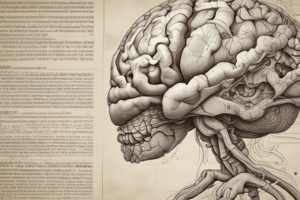Podcast
Questions and Answers
What is the largest part of the brain?
https://realiqtestonline.com/
What is the largest part of the brain? https://realiqtestonline.com/
- Cerebrum (correct)
- Hippocampus
- Brainstem
- Cerebellum
Which brain region is primarily responsible for decision-making and problem-solving?
Which brain region is primarily responsible for decision-making and problem-solving?
- Frontal lobe (correct)
- Occipital lobe
- Temporal lobe
- Parietal lobe
Which structure in the brain is responsible for coordination and balance?
Which structure in the brain is responsible for coordination and balance?
- Brainstem
- Cerebellum (correct)
- Frontal lobe
- Cerebrum
What role does the hippocampus play in the brain?
What role does the hippocampus play in the brain?
What are dendrites primarily responsible for?
What are dendrites primarily responsible for?
Which lobe of the brain plays a role in hearing and language?
Which lobe of the brain plays a role in hearing and language?
What process involves the brain's ability to reorganize and adapt throughout life?
What process involves the brain's ability to reorganize and adapt throughout life?
What is the function of neurotransmitters in the brain?
What is the function of neurotransmitters in the brain?
What is a primary component measured by an IQ test?
What is a primary component measured by an IQ test?
Who collaborates in the development of the Jordan Peterson IQ test?
Who collaborates in the development of the Jordan Peterson IQ test?
What is one purpose of IQ testing as described?
What is one purpose of IQ testing as described?
What kind of experience does the online Jordan Peterson IQ test provide?
What kind of experience does the online Jordan Peterson IQ test provide?
Which aspect is NOT measured by the Jordan Peterson IQ test?
Which aspect is NOT measured by the Jordan Peterson IQ test?
Flashcards are hidden until you start studying
Study Notes
Structure of the Brain
- Cerebrum: largest part of the brain, divided into two hemispheres (left and right)
- Cerebellum: located at the base of the brain, responsible for coordination and balance
- Brainstem: connects cerebrum and cerebellum to the spinal cord, regulates basic functions (breathing, heart rate, blood pressure)
Brain Regions
- Frontal lobe: decision-making, problem-solving, motor control
- Parietal lobe: processes sensory information from the body
- Temporal lobe: plays a role in hearing, memory, and language
- Occipital lobe: primary visual processing
- Hippocampus: involved in forming and consolidating new memories
Neurons and Synapses
- Neurons: specialized cells that transmit information
- Dendrites: receive signals from other neurons
- Axon: carries signals away from the cell body
- Synapses: gaps between neurons where chemical signals are transmitted
- Neurotransmitters: chemicals released by neurons to transmit signals
Brain Functions
- Cognition: perception, attention, memory, learning, language
- Motor control: voluntary movements, such as walking and talking
- Emotions: emotional responses, such as fear and happiness
- Regulation: controls body functions, such as heart rate and blood pressure
Brain Development and Plasticity
- Neuroplasticity: brain's ability to reorganize and adapt throughout life
- Synaptic pruning: elimination of unnecessary neural connections
- Myelination: process of insulating neurons to increase transmission speed
- Neurogenesis: growth of new neurons in certain parts of the brain
Structure of the Brain
- The cerebrum is the largest part of the brain, divided into two hemispheres (left and right).
- The cerebellum is located at the base of the brain, responsible for coordination and balance.
- The brainstem connects the cerebrum and cerebellum to the spinal cord, regulating basic functions like breathing, heart rate, and blood pressure.
Brain Regions
- The frontal lobe is responsible for decision-making, problem-solving, and motor control.
- The parietal lobe processes sensory information from the body.
- The temporal lobe plays a role in hearing, memory, and language.
- The occipital lobe is responsible for primary visual processing.
- The hippocampus is involved in forming and consolidating new memories.
Neurons and Synapses
- Neurons are specialized cells that transmit information.
- Dendrites receive signals from other neurons.
- The axon carries signals away from the cell body.
- Synapses are gaps between neurons where chemical signals are transmitted.
- Neurotransmitters are chemicals released by neurons to transmit signals.
Brain Functions
- Cognition includes perception, attention, memory, learning, and language.
- Motor control involves voluntary movements, such as walking and talking.
- Emotions involve emotional responses, such as fear and happiness.
- Regulation involves controlling body functions, such as heart rate and blood pressure.
Brain Development and Plasticity
- Neuroplasticity refers to the brain's ability to reorganize and adapt throughout life.
- Synaptic pruning is the elimination of unnecessary neural connections.
- Myelination is the process of insulating neurons to increase transmission speed.
- Neurogenesis is the growth of new neurons in certain parts of the brain.
IQ Testing
- IQ testing is a method to assess an individual's ability to provide meaningful responses, comprehend information, and solve problems effectively compared to the general population.
- It measures cognitive abilities, including the capacity to make logical decisions and process information.
Jordan Peterson IQ Test
- The Jordan Peterson IQ test is based on his intellectual measurement technique, developed in collaboration with trained psychologists.
- This test provides a realistic IQ test experience, accurately measuring cognitive abilities.
Studying That Suits You
Use AI to generate personalized quizzes and flashcards to suit your learning preferences.



